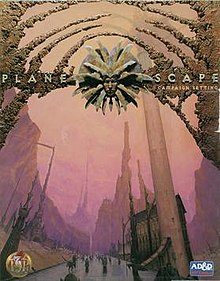There hasn't been much in the way of support for the Planescape setting since 2e AD&D. It feels like WotC keeps teasing the return of the setting for 5e with things like including Shemeshka's preface in Mordenkainen's Tome of Foes, but nothing substantial has yet to materialize. That's okay; as always, it's the fans who have kept the fires burning. Here's some excellent Planescape-related content I've found:

A Planescape comic by don Fuflon (Alexy Shatohin) and Deusuum (Alexander Palkin)
Interactive map of Sigil, City of Doors
Trapped in the Birdcage
A streamed 5e Planescape game run by Holly Conrad
A streamed 5e Planescape game run by Holly Conrad













